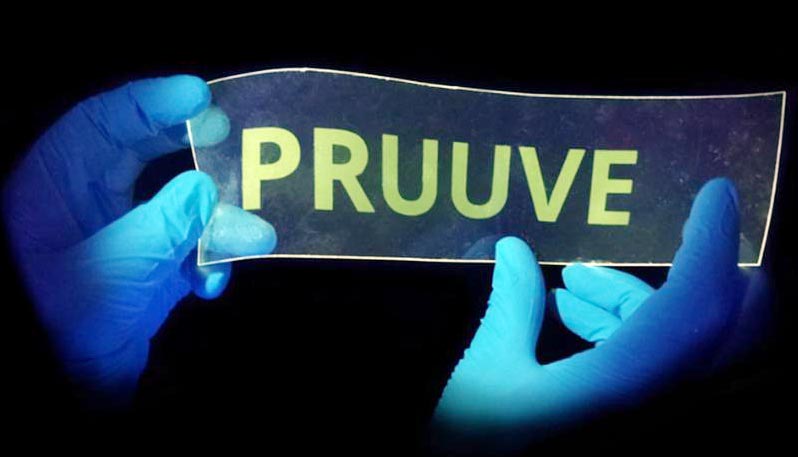

PRUUVE
(c) Tim Achenbach
TU Dresden spin-off project PRUUVE launched…
With the EXIST research transfer PRUUVE (Phosphorescent Response Under UV Excitation) three physicists of the TU Dresden want to bring reusable UV sensor foils and labels to market maturity. With this idea, the team is currently also nominated for the Saxon Founders Award 2022 (futureSAX).
Artificially generated UV radiation is used in numerous industrial applications: for example, for the sterilization of air, water and surfaces or for the rapid curing of coated surfaces, printing inks, paints or adhesives. However, quality and success control in the use of UV radiation still has a great deal of room for improvement, especially with regard to the accurate measurement of the UV dose. If, for example, a too low UV dose is used in offset printing, entire batches of product have to be discarded because the coating is not dry. Surface disinfection, on the other hand, can leave behind harmful viruses or bacteria. Therefore, overdosing is often used, resulting in high operating costs and premature maintenance.
“Our UV sensor films enable accurate measurement of the UV dose for the first time directly on the surface and during the manufacturing process,” says Dr. Paul-Anton Will, co-founder and responsible for product development at PRUUVE. “We offer a reliable and fast control of success in UV curing and UV disinfection. Companies can thus avoid unnecessary waiting times, reduce their energy costs and also reduce material wear.” In the future, the technology will also be used in other products, for example as reusable labels or in security applications.
The physical principle behind it was discovered and further developed in 2018 in the laboratories of the IAPP (Dresden Integrated Center for Applied Physics and Photonic Materials) and the Institute of Applied Physics by Prof. Sebastian Reineke and his team. “We use ultra-thin films coated with phosphorescent organic molecules. When the molecules are excited by irradiation with UV light, they begin to glow,” Will explains. “The special feature here is that we can control exactly at which irradiated UV dose the phosphorescence appears by layer composition.”
Through a spin-off, the three physicists Tim Achenbach, Dr. Paul-Anton Will and Dr. Philipp Wellmann want to bring the technology to market in the next 18 months. To this end, the team has been receiving EXIST research transfer funding of around 790,000 euros since May 1, 2022. With the EXIST program, the German Federal Ministry of Economics and Climate Protection supports outstanding, research-based start-up projects. The scientists found advice and support with the application process at dresden|exists, the startup service of Dresden’s universities and research institutions. In their own “Venture Acceleration Program”, the consultants will continue to support the team until the foundation of the company.
The founding team brings not only technological knowledge but also entrepreneurial experience to the table: Tim Achenbach is the scientist in the team and drives the technological development. Dr. Paul-Anton Will is responsible for customer-oriented product development and production. Dr. Philipp Wellmann contributes his network and experience as managing director and sales manager in the areas of research & development and marketing & sales. Prof. Sebastian Reineke continues to accompany the project as scientific mentor and advisor.
The team is currently looking for reinforcement in the areas of technology, laboratory and sample production. For more information: www.pruuve.de
Media inquiries:
Frauke Posselt
dresden|exists, Startup Service of Dresden Universities and Research Institutes
Tel: +49 351 463-36813
E-Mail: frauke.posselt@dresden-exists.de
Wissenschaftliche Ansprechpartner:
Dr. Paul-Anton Will
Project Manager PRUUVE
TU Dresden, Dresden Integrated Center for Applied Physics and Photonic Materials (IAPP) and Institute for Applied Physics
Tel.: +49 351 463-34905
E-Mail: paul-anton.will@tu-dresden.de












